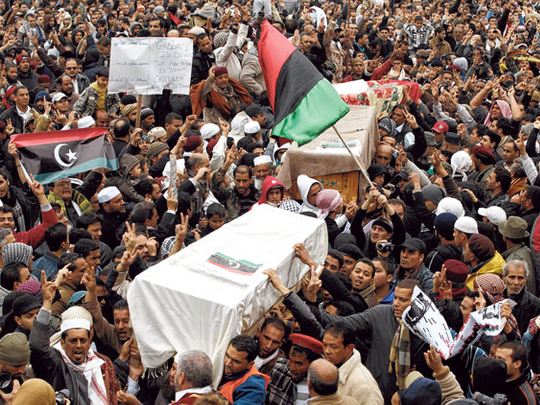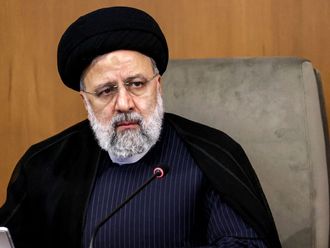
Dubai: Libya’s besieged despot Muammar Gaddafi was waging what many consider his final battle in and around Tripoli as the Middle East erupted in a frenzy of protests over raging corruption, delayed reforms, denial of decent livelihoods and staid, autocratic leadership.
A defiant Gaddafi Friday challenged the rebels, saying those who do not like him do not deserve to live. Addressing his supporters in Tripoli’s Green Square amid tight security, Gaddafi said he would not give up the leadership of the country under any circumstances.
In focus: Unrest in the Middle East
Earlier, militias loyal to Gaddafi opened fire on protesters streaming out of mosques and marching across Tripoli, killing several people, reports said. In rebellious cities in the east, tens of thousands held rallies in support of the first Tripoli protests in days.
With the regime offering no prospect for an acceptable solution to the crisis, Libyans have opted to go ahead with their revolution no matter its toll in lives, Salim Al Okali, member of the revolutionary committee in Derna, told Gulf News.
At the United Nations, western powers pressed for international sanctions including an arms embargo and travel ban against Gaddafi ahead of a UN Security Council meeting.
The European Union has already agreed on potential sanctions, EU diplomats said, and the US has also threatened measures against the Libyan leader.
Britain and France have taken the lead in drawing up a draft UN resolution which proposes an arms embargo, a travel ban and assets freeze on members of the Gaddafi regime and a referral of the Libya crisis to the International Criminal Court, diplomats said.
Draft UN resolution
The draft was expected to be officially distributed to all 15 members of the Security Council later but diplomats said most missions would have to refer the action back to their capitals for a final decision.
In Geneva, the UN’s top human rights official warned that mass killings in Libya, possibly of thousands, require the world to “step in vigorously” and immediately end a brutal crackdown on anti-government protesters.
In Iraq, security forces used water cannons and tear gas to disperse thousands of angry protesters in Baghdad as a “Day of Rage” across Iraq left nine people dead in clashes with police.
Yemen also saw vast crowds who demanded that veteran President Ali Abdullah Saleh step down in mass protests that left one dead and 20 injured in clashes with police.
In the gathering at Tahrir Square in Cairo, activists urged the military to overhaul the newly appointed cabinet and install a fresh team of technocrats, besides faster reforms and lifting of emergency rule.
The UAE will send two planeloads of relief materials to Libya via Turkey, Foreign Minister Shaikh Abdullah Bin Zayed Al Nahyan said in Abu Dhabi Friday.“Our aim is to help the people of Libya … That is the main concern at the moment. Everything else is secondary,” he said.










